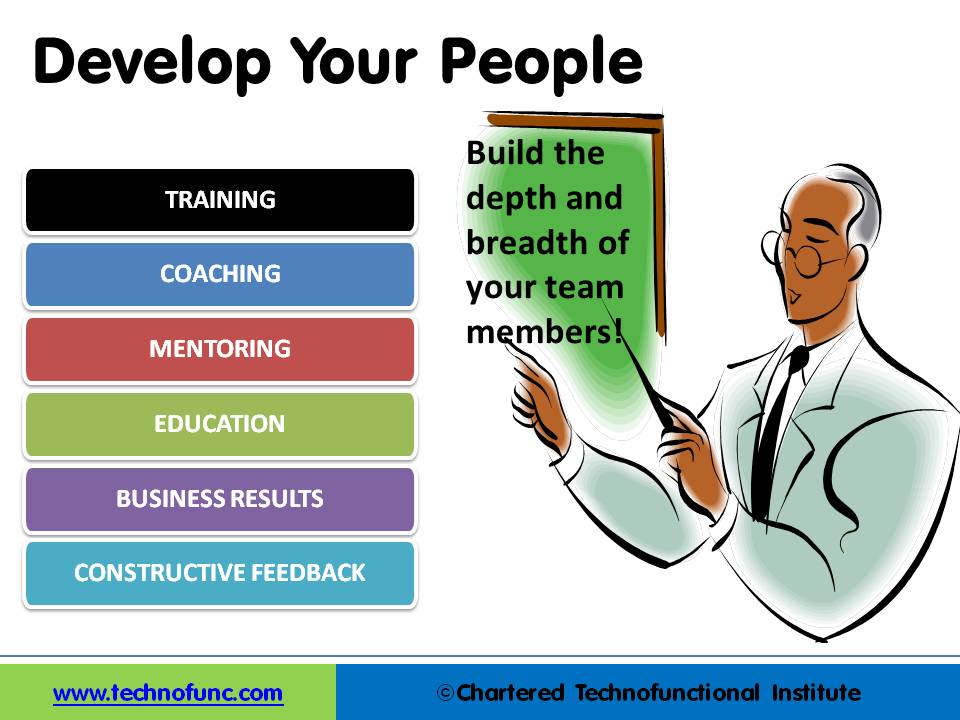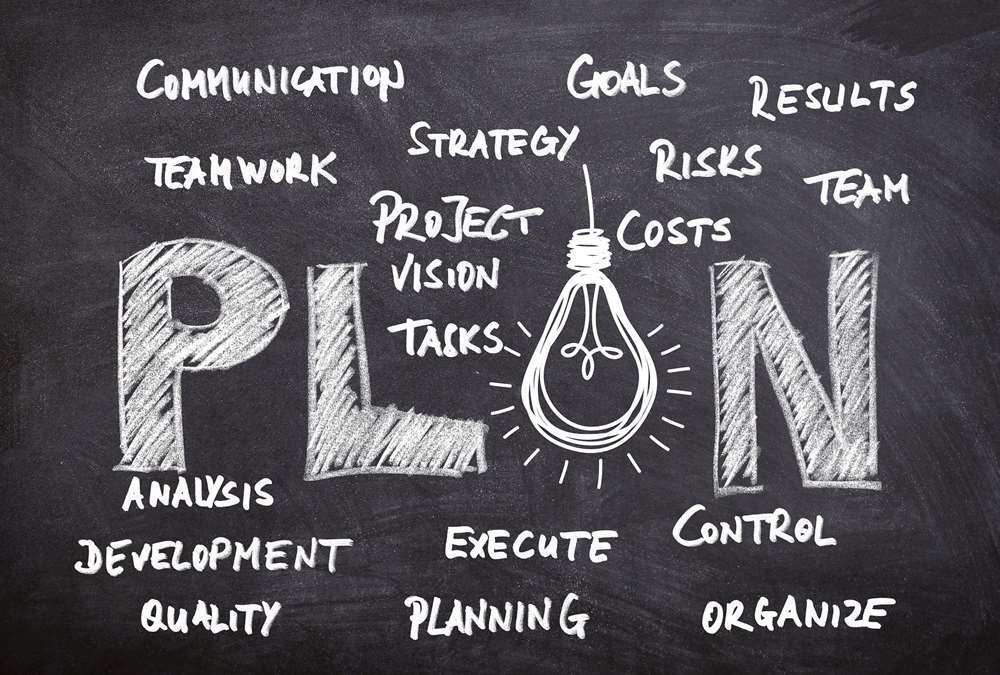- Home
- Business Processes
- Industry Knowledge
- Aerospace Industry
- Automotive Industry
- Banking Domain
- BFSI Industry
- Consumer/ FMCG Industry
- Chemicals Industry
- Engineering & Construction
- Energy Industry
- Education Domain
- Finance Domain
- Hospitality Domain
- Healthcare Industry
- Insurance Domain
- Retail Industry
- Travel and Tourism Domain
- Telecom Industry
- Leadership Skills
- eLearning
- Home
- Leadership
- Project Leadership
- Tools for Developing Your Team
Tools for Developing Your Team
If a manager has too many weak spots in the talent of the team, the ability to empower the team members to independently execute the project is impaired. Assignments fall behind schedule or stretch out because the needed skills or knowledge are not in place when needed. To successfully execute important projects, hiring talented people, and increasing the talents of existing staff are most important.
Continuous Development of the Team
Continued focus on the development of the team helps to put the manager in a position to pursue important assignments and build the confidence that the team is prepared for the task at hand. Your confidence on your people is the key to empower people. Learning culture is an environment that supports an open mindset, an independent quest for knowledge, and embraces shared learning directed toward the mission and goals of the organization. Companies with continuous learning cultures enjoy a number of benefits, including:
- They are 46 percent more likely to be first to market
- They experience 37 percent higher productivity
- They are 92 percent more likely to innovate
Importance of Training & Coaching
Creating depth requires a commitment to growing people. The manager cannot wave a magic wand and all of a sudden get high-performance. You need to develop your team using different techniques like training, mentoring and coaching and formal education. There is a much-underused resource company can leverage to complete their transition toward a continuous learning culture: peer coaching. If implemented correctly, a continuous learning culture based on peer coaching can drive performance, boost employee engagement, and develop future leaders.
Take Every Assignment as a Learning Opportunity
This depth of professionals comes about by seeing every project or assignment as having learning opportunities within. Projects and tasks provide a platform to do the work and grow at the same time. By building well-trained people, you have automatic trainers within the team. Mentors are created on their own. Once your people develop and grow, empowering them becomes easy. The rapid change in business and organizations means everyone needs to constantly be learning. More and more people are looking for options on their own because they aren’t getting what they need from their employers.

Understand the Big Picture
Once empowered, to make the right decisions, people must understand how the company generates money, what the expenses are, and how it makes a profit. To achieve this, share the key financial data and provide meaningful explanations of these figures. Show people how their jobs are tied to these results and how empowered performance can have a positive impact on the numbers. Team leaders should help their direct reports connect their learning goals to wider company objectives and ensure that team members have the time and resources they need to reach their goals. Start building your team’s business process understanding by leveraging technofunc’s functional training. Whether the learner is a team leader or team member, or both, they will learn how to be effective team players and team leaders, solve problems, and work towards common goals via highly interactive case studies, exercises, and use of TechnoFunc resources.
Feedback is Important
The ability to give effective feedback is a powerful skill, yet it is underdeveloped in new managers. Giving effective feedback involves a combination of several key skills that managers need — the ability to observe, communicate, and listen. Helping future leaders develop those skills early on will ensure they are prepared to coach their teams. Provide frequent feedback so that people know how they are doing. Apart from rewards and recognition, people deserve your constructive feedback so that they can continue to develop their knowledge and skills.
Explore Technofunc Toolkit for Team Development
Technofunc resources aim at bridging the gap between technical and functional expertise and have invested a lot of effort into creating tutorials on various business processes and industry knowledge. Our curriculum is designed to equip a person to leverage technology as well as learn critical business application processes along-with system integrity and security, systems audit, project management, and other key methods widely used today that helps in the integration of business processes and practices in tune with the requirements that are driven both by business, globalization and legislature. We can help your team gain expertise in both technical and functional skills, which when applied collectively comprise of professional competence and excellence.
Given below are the different technofunc resources to start building your skills:
Build Domain Skills
- Aerospace Domain
- Automotive Domain
- Banking Domain
- BFSI Domain
- Consumer / FMCG Domain
- Chemicals Domain
- Engineering and Construction Domain
- Energy Domain
- Education Domain
- Financial Management & Business Dynamics
- Global Markets Domain
- Hospitality and Leisure Domain
- Healthcare Domain
- Insurance Domain
- Technology Domain
- Retail Domain
- Travel Domain
- Telecom Domain
“The difference between great people and everyone else is that great people create their lives actively, while everyone else is created by their lives, passively waiting to see where life takes them next. The difference between the two is the difference between living fully and just existing.”
- Michael E. Gerber
Related Links
You May Also Like
-
Stress is a product of the busyness of modern life. It has assumed grave dimensions ever since the emergence of industrialism. In fact, stress is a natural, ongoing, dynamic, and interactive process that takes place as people adjust to their environment. Stress can be brought about by positive or negative life events. Distress can cause disease and eustress or positive stress can promote wellbeing and increased productivity. Learn to recognize and be responsible for your stress, and learn the ways to manage stress.
-
Understanding Corporate Strategy
Management outlook and procedures have been revolutionized by more and more innovations over the recent years. It is no longer possible to follow traditional approaches to develop your organization's direction, its management as well its effectiveness. Senior managers need to be good decision-makers. In this section, we introduce concepts for strategy, strategic planning, strategic leadership, their exact meaning and associated terms, and how to use them.
-
Narrative leadership is interpreted as the leader who aspires to construct leadership by telling stories. Leadership is a task of persuasion, of winning people’s minds and hearts. Storytelling is thus inherently suited for the task of leadership. Learn about the narrative leadership style and how to use this style to inspire and motivate followers or to manage change.
-
Functional skills are the core competencies that can be transferred to different work areas like understanding of finance is independent and a finance expert can comfortably adapt to a manufacturing or service industry. Functional skills are obtained by understanding the various processes and the principles applicable to a business function. Functional experts are in great demand as they are specialists and required to manage the business processes like human resources, operations, or finance.
-
Tools for Developing Your Team
If a manager has too many weak spots in the talent of the team, the ability to empower the team members to independently execute the project is impaired. Assignments fall behind schedule or stretch out because the needed skills or knowledge are not in place when needed. To successfully execute important projects, hiring talented people, and increasing the talents of existing staff are most important.
-
Improving Skills & Competencies
Whenever you are looking for a job or having your yearend discussion with your manager, two terms generally referred to be “Skills” and “competencies”. Today success in a career is an outcome of having essential competencies and building required skills. Skills could be a major distinguishing factor for you to move up on the career ladder and jump from one role to another. Leadership skills when combined with relevant domain and functional expertise can transform your entire career growth and help you have a fulfilling career.
-
Stress is an essential part of our life. No one can live without stress. Stress can be beneficial as well as harmful. Stress as a positive influence adds excitement and hope while as a negative influence it can result in destructive feelings, anger, and depression. Although the general orientation to stress is to consider unfavorable outcomes, yet one must have observed that stress experiences may also facilitate the development of effective and varied coping behavior, increased personal resources, and lead to a sense of competence in development. Stress at a moderate level is not only inevitable but may be useful for physical and mental well-being.
-
Concept & Definition of Stress
Stress is a popular expression used by people in day to day life. Pressures of day to day living sometimes necessitate coping or dealing with them and stretch the body beyond its natural capacity. They are called stressors. Stress is a natural, ongoing dynamic, and interactive process that takes place as people adjust to their environment.
-
Authentic leadership is an approach to leadership that emphasizes building the leader's legitimacy through honest relationships with followers which value their input and are built on an ethical foundation. The authentic leader acts upon his or her values and beliefs, and inspires others to do the same, is committed to know and develop oneself. Are you committed to developing yourself; know your motivations and the purpose of your leadership? Read this article to know more about authentic leadership style and discovering your authentic self.
-
In the early years, most jobs were skill-oriented, and with the development in lifestyles and technology, the current jobs are knowledge-oriented jobs such as management, accountants, design, or computing. Career paths encompass varied forms of career progression and this article discusses how we can build a fulfilling career? Learn here about career paths, industries, and opportunities for gaining experience in the field of your choosing.
Explore Our Free Training Articles or
Sign Up to Start With Our eLearning Courses

About Us
Learning
© 2023 TechnoFunc, All Rights Reserved










